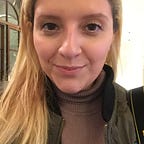In a Queens neighborhood, uninspired voters
Outside the brown brick building housing the Florence E. Smith Community Center on 34th Avenue in Corona, Queens, where cars zoom by in either direction through rows of leafy trees, voters make their way up and down the staircases of the election center, strolling through the fences decorated with signs of “vote here” in several languages. Some take selfies just outside the building, making sure that the “I voted” sticker on their chest appears in the frame. Others leave the building with the sticker held loosely in their grip. Many, however, are left in an uninspired daze.
Corona, a small but lively pocket of Queens, has over 110,000 people, with 70 percent of them identifying as Hispanic.
Michael Gonzalez, 77, was born in Brooklyn but has called Corona home for the past 45 years. Donning a dark beret and leaning against his walker, he looked onto the building where he cast his vote just moments ago, and shrugged.
“I voted for Hillary,” said Gonzalez, “but what else do I have?”
Although Gonzalez has always voted Democrat, his vote for Hillary Clinton, the Democratic nominee, was not made with conviction. But that does not mean Trump, the Republican nominee, gets his vote.
“Well, one is lying through her teeth,” he mutters, “and the other is a racist,” Gonzalez said of Clinton and Trump.
“I voted for the lesser of the two evils, but I’m just tired of this hooplah.”
Another Corona resident, 31-year-old Jennelly Rosario, stands proud as she calls on her two daughters, barely toddlers, to join her in a photo with their stickers.
Although Rosario voted for Clinton, her reasons were centered more on whom she isn’t voting for.
“There are many reasons I voted for her,” she said in Spanish, “but really, I do not like Trump’s personality.”
But in thinking of a Trump victory, Rosario simply sighed and shook her head.
“If Trump wins, I guess we have to accept it.”
At the edge of the large block between 102nd and 103rd street, where the community center’s long black fence stretches toward the eternally buzzing Northern Boulevard, Rosario Mocha, 35, is accompanied by her four small children, one of them inside the stroller she is pushing.
An Ecuadorian citizen, Mocha has been living undocumented in Corona for over a decade.
“I can’t vote,” she said in Spanish, “but even if I could, I’m not sure who I would pick.”
Mocha acknowledged that Trump’s comments on Latinos and Hispanics haven’t been enough to sway their vote toward Clinton, including hers, a notion perhaps all that more head spinning considering news of a strong Hispanic voter surge benefitting Hillary Clinton, according to The New York Times.
“They say that one says this and that the other says that,” Mocha bitterly exclaimed. “So, I really don’t know.”
